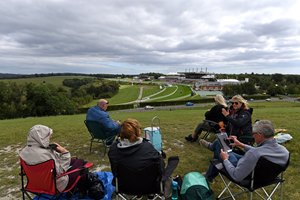Johnson Reveals Dates to Reopen Racecourses in UK


Racecourses and bookmakers in England were given a clear set of dates Feb. 22 to work towards for reopening as prime minister Boris Johnson gave the first details of a 60-page document laying out the steps to leaving lockdown.
Non-essential retail, which has for most of the pandemic included betting shops, will form part of phase two of the plan, with April 12 penciled in as the provisional date if the data surrounding the effectiveness of the vaccination program continues to be positive.
Johnson's plan places each step at five-week intervals to allow proper time to analyze the data and then a week's notice for businesses to prepare to resume trading.
On the most optimistic timetable, should the first two phases pass without a significant spike in hospitalizations, then the return of spectators to sports grounds including racecourses will be possible from May 17 with up to 4,000 in attendance, or 50% of capacity.
The prime minister told the House of Commons: "The turnstiles of our sports stadia will once again rotate, subject in all cases to capacity limits depending on the size of the venue. And we will pilot larger events using enhanced testing with the ambition of further easing of restrictions in the next step."
That raises the possibility of a limited attendance at Epsom for the Investec Derby (G1) meeting, which begins June 4, while Goodwood's two-day May festival and the Temple Stakes (G2) fixture at Haydock May 22 are early dates in the calendar that could welcome spectators.
Larger events feature in the final wave of measures due to be introduced June 21—two days after the end of Royal Ascot—with earlier test events likely to guide government and organizers as to the use of on-site testing.
With all schools in England due to reopen on March 8, leader of the opposition Sir Keir Starmer welcomed the government's cautious approach to reopening the economy and placed it in stark contrast to previous abortive efforts.
"I'm glad the prime minister spoke today of caution, of this being irreversible, of assessing the data and following the evidence," said Starmer. "Those are the right guiding principles and I have to say it's a welcome change from some of the language the prime minister's used in the past."
Key Dates on the Road Out of Lockdown
- March 8: schools reopen and two people can meet socially outdoors
- March 29: up to six people from two different households can meet outside; outdoor sports facilities such as golf courses to reopen
- April 12: possible reopening of non-essential retail; limited hospitality outdoors; possible return of university students
- May 17: pubs and restaurants reopen indoors with social distancing; families could travel on short breaks within the UK
- June 21: some further social mixing could be allowed indoors, larger events could resume in conjunction with attendee testing
That timetable confirms that betting shops will remain closed for the Cheltenham Festival, while an April 12 start date would fall two days after the Randox Grand National, denying a major sources of revenue for both the gambling industry and racing, through media rights payments to courses and reduced contribution to the levy.
The Levy Board has thus far committed to continuing its increased contributions to prize money until the end of April and will meet this week to consider the position for May and June.
A senior industry source put the combined cost of the month-long pre-Christmas lockdown in England as £12.5 million, and the Levy Board's finances could be hit even more seriously by the absence of high street retail betting during Cheltenham and Aintree.
The Welsh government announced last Friday that restrictions on non-essential retail would come under consideration over the three weeks leading up to its next coronavirus review, scheduled for March 12.
Racecourses have already been planning for the continued absence of crowds through the spring. Executives at several independent tracks told the Racing Post last week that they were budgeting for late summer or even September in that regard.
Chester has unveiled a more ambitious plan to host 5,000 people a day during its May meeting if allowed by government, based around the deployment of mass rapid testing for COVID-19.

Johnson repeated on several occasions during his address to the House of Commons that the roadmap would chart a path out of lockdown that was "cautious but irreversible."
The prime minister spelt out four tests that will need to be met before each stage for reopening society and the economy can be given the green light: the continued success of the vaccination program; continued evidence of the vaccines' positive influence on rates of hospitalization and mortality; overall low infection rates; and the absence of threats posed to the vaccination program by new COVID variants.
First minister Nicola Sturgeon will address the Scottish Parliament on Tuesday to outline a pathway forward that she described on Monday as sharing "broad similarities" to the Westminster plan for England.
Nursery-aged children returned to class in Scotland on Monday and Sturgeon will list "an indicative order of priorities" in terms of measures being eased when she speaks to the Holyrood chamber.
